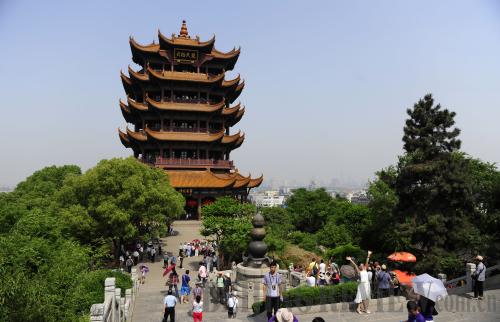|
 |
|
DAY OF TRAVEL: People enjoy the beautiful scenery at the Yellow Crane Tower in Wuhan, Hubei Province, on May 19, the first National Tourism Day (XINHUA) |
Students' Sleep
On May 16, the China Youth and Children Research Center revealed that in the past decade or so, children's sleep times have decreased. At least 80 percent of primary and middle school students do not get a good night's rest.
In general, Chinese adolescents' health is also deteriorating. The past two decades have seen a sharp rise in students' obesity rates and eyesight problem rates. Almost 60 percent of junior middle school students are shortsighted, and the proportion for senior middle school students is 70 percent and 80 percent for college students.
Academic pressure is the main culprit for a lack of sleep. The Central Government proposes cutting pressure on students, and in some places, local education departments even offer complaint hotlines for students to complain about heavy class work and study requirements. But this is just not enough.
Students are struggling to stay awake in class. Is it very difficult to give students more time to rest? Schools, parents, the government and society as whole are accountable for students' sleepiness. Educational departments must cancel additional school requirements.
Lack of sleep is harmful to children and adolescents. Education reform should be steered to transfer overemphasis on exam results to the development of students' comprehensive quality.
Guangzhou Daily
Suspicious Projects
The recent rumors that the Jianfu Palace Garden in the Palace Museum in Beijing had been used to be a wealthy private club have aroused the public's attention.
It is very common to see "imperial restaurants" in some historical sites in Beijing, such as the Summer Palace or the Temple of Heaven. The question is that how these businesses manage to go through approval procedures.
China's current law does not forbid proper commercial use of historical and cultural relic sites. The protection of cultural relics needs money, so if these commercial programs can economically help relieve taxpayers' burdens, it's all right to have them.
However, cultural relics are treasures that belong to the whole nation. Thus, any commercial programs related to these sites should not serve a small group of people while at the same time block out ordinary people by expensive admission tickets.
In many countries, even the smallest bit of reconstruction or renovation of historical sites needs to go through an arduous application and approval process. In contrast, China has much looser rules and regulations on cultural relic preservation.
As for the commercial operation of cultural relics, there should be explicit regulations on operation ranges and strict approval procedures. If any cultural relic protection agencies want to get involved in commercial programs, they must subject the program scenarios to the public's examination.
The Beijing News
Improper Charge
It is reported that the real estate management department of Yangxian County, Shaanxi Province, demanded that every renter pay 30 years' rent in order to move into the low-rent houses built by government for low-income people. But 20 years' rent is a considerable amount for needy families applying for the houses. This practice stopped after it garnered media attention.
Low-rent houses are designed for relatively poor urban residents, and so if they are asked to put up 30 years' rent before they even move in, this housing program will never really serve its purpose.
The county government claims they are only doing this because they lack the funds needed to build the low-rent houses. The government is a provider of basic public services and necessities, not a market entity that is free to chase maximum profits like businesses. This case reveals that it's urgent to reform the administration of government. Governments at various levels must understand that their responsibility is to serve the people. Government's budget must be open to the public and the use of fiscal revenue must be go through strict procedures.
Guangzhou Daily
Tourism Day
May 19, 2011 marked China's first National Tourism Day. Many scenic spots chose to offer discounted tickets to attract more visitors on the day.
Chinese people are now becoming increasingly interested in tourism. Last year there were 2.1 billion trips made. Nevertheless, frequent tourism-related complaints and disputes imply that China's overall tourism industry needs substantial improvements. Against this backdrop, the National Tourism Day was meant to further standardize China's tourism industry and improve tourism services.
Favorable measures are necessary, but they are not enough. The development of tourism should be based on more efforts. For example, tourism departments may set up more information centers to make traveling more convenient and crack down on illegal practices in the tourism market.
As far as scenic spots are concerned, its better for them to strive to improve the cultural taste and service quality than to harvest immediate economic interests.
China Culture Daily | 